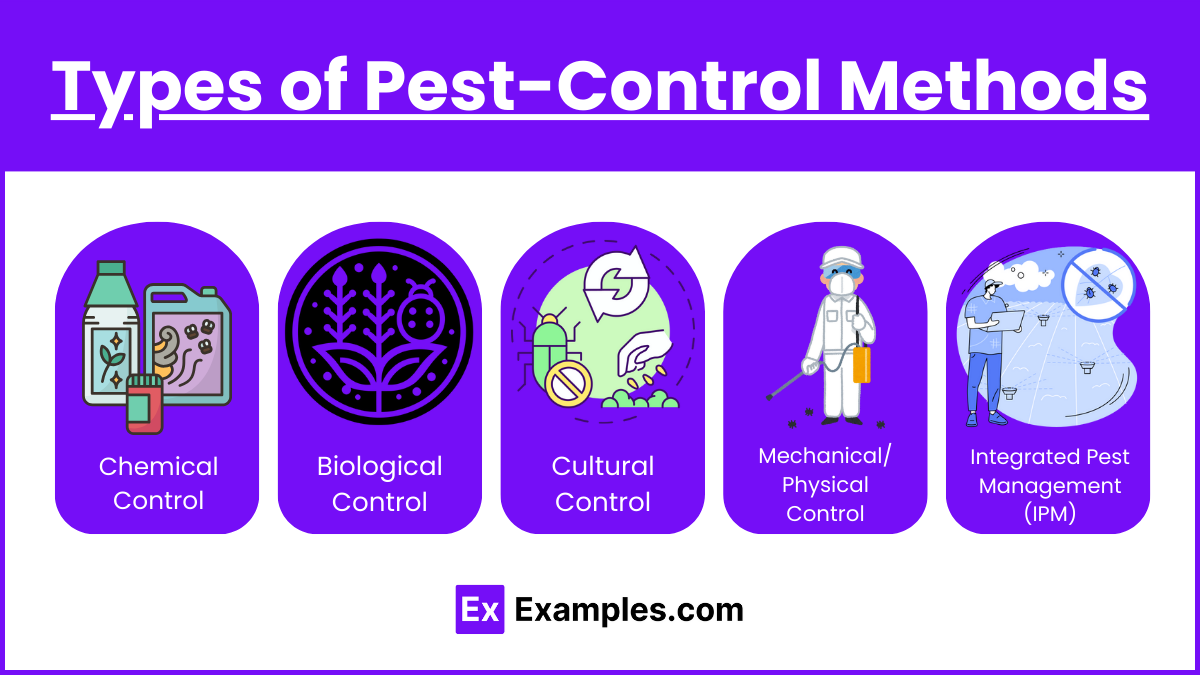The smart Trick of Pest Control That Nobody is Discussing
The smart Trick of Pest Control That Nobody is Discussing
Blog Article
Not known Factual Statements About Pest Control
Table of ContentsHow Pest Control can Save You Time, Stress, and Money.Indicators on Pest Control You Need To KnowExcitement About Pest ControlThe Facts About Pest Control UncoveredAll about Pest Control
Limitations of Chemical Monitoring Be able to evaluate pest problems, determine if monitoring is needed, and make appropriate referrals utilizing IPM methods. Be familiar with various techniques of pest monitoring - their benefits and limitations.This phase goes over (IPM), a technique that uses knowledge concerning parasites and their, methods, nonchemical methods, and chemicals to manage parasite issues. Additional info about IPM for certain plants is included in chapters that concentrate on those plants. Nonchemical parasite control actions are stressed in phase 17, "Organic Gardening." Taking care of birds and mammals is covered in chapter 20, "Wildlife." Taking care of in the backyard and garden is covered in chapter 6, "Weeds." Bugs in a yard or landscape may include bugs and termites, weeds,, mammals, and birds.
Lots of people hurry to draw, hoe, or spray every weed they see. Pests and weeds, nevertheless, play a function in the. After planting a yard or establishing a lawn, the natural process of plant sequence begins to restore and nonnative plants. A weed growing in a yard represents the very first phase in a series of events that, if allowed to continue, might eventually lead to a woodland.
What we call "pests" are component of a natural system at job. Only human beings take into consideration certain species pests when they occur where they are not desired.
Little Known Facts About Pest Control.
Parasites susceptible to a chemical were rapidly killed, leaving immune ones to reproduce and increase. It came to be clear that pesticides alone would not resolve all insect troubles. Instead, overuse of chemicals caused the advancement of resistant bugs. Scientists started to create a new technique to pest control. This brand-new approach was defined as incorporated insect monitoring (IPM).
An IPM strategy enables some degree of bugs in the atmosphere. Parasites are a lot less likely to endure a program that uses several methods of reducing their populaces. Integrated pest administration was first suggested by entomologists because pests were the initial team of bugs to confirm tough to handle with chemicals alone.
bug and host precisely. and think about financial or visual injury. A threshold is the point at which action should be taken. a treatment method using mechanical, cultural, organic, or chemical controls, or a combination of these techniques. success of therapies. IPM has actually prolonged beyond insects to management of all pest populations: weeds, condition microorganisms, discover here and animals.
The smart Trick of Pest Control That Nobody is Discussing
Monitoring rather than eradication of bugs is the objective. An IPM plan begins with a careful analysis of each parasite problem.
Clover growing in a lawn might be deemed an undesirable weed, yet as a vegetable it is manufacturing nitrogen for the dirt and the flowers are providing nectar to honey bees and other. Resistance for some weeds may belong to an IPM plan. may be eating the fallen leaves of a plant, however when they are identified as the larvae of Eastern tiger swallowtail butterflies, their damages may be endured so we can delight in the lovely butterfly.

The 2nd most crucial device additional info in bug management is very early intervention. Responding to problems rapidly, prior to they have time to increase, needs a much less significant treatment.
6 Simple Techniques For Pest Control
Many risk-free, useful, nonchemical approaches of plant defense and pest administration might minimize or eliminate the need to spray. Various other approaches are most useful when utilized with pesticides. To implement management practices correctly and to reduce losses, gardeners need to know the sorts of pests that assault plants and recognize pest biology.

Performing a dirt test and applying just the suggested quantity important source of plant food and lime optimizes the advantage to the plant while decreasing troubles associated with excessive use of plant food - Pest Control. Treatment the dirt with several inches of mulch protects the plant in a number of methods: minimizing dirt water loss to evaporation, minimizing weed competition, supplying nutrients, and producing an ideal setting for earthworms and microbes that maintain the dirt loosened for roots and damage down natural material to release nutrients
If mulch touches the trunk, it can create a method for voles, bacteria, and fungis to strike the plant. Do not utilize manure or compost that has actually not thoroughly disintegrated as a leading dressing since it can motivate unfavorable insects. Research suggests that farming is harmful to soil structure.
The 5-Second Trick For Pest Control
If tilling is deemed necessary, consider doing it in the fall when the life cycles of many parasites brings them near the surface area. At the surface area, pests come to be exposed to the climate as well as birds and other all-natural enemies. Loss tilling can likewise destroy insects in crop residues. Usage disease-free and insect-free certified seeds and plants if available.
Report this page